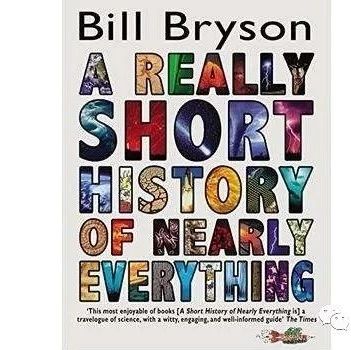A Short History of Nearly Everything
Recently, I read a very interesting yet profound book called A Short History of Nearly Everything. In it, there are many topics and covers a large range of subjects. But after reading four points in the book really makes me think a lot.
Firstly, I want to exclaim that life is a miracle, a true miracle. In order to create life, you need to have the right elements and the environment needs to be fitting. As far as we today know, only our Earth has the environment to brew complex life and the atoms that happily flock together to form living things on Earth are exactly the same atoms that just won't do it elsewhere. Life is a fantastic miracle! Also, you should feel good about your existence. If any of your ancestors didn't successfully marry, get pregnant, and have a baby, then you can't be here. It is also a miracle!
Secondly, through the long years, the evolutionary path of humans was long and dangerous. 200 million years ago, in the reign of the dinosaurs, mammals nearly did not have any living spaces. They were driven to places where weathers were extreme and the environment was severe. The dinosaurs nearly drove them into the brink of extinction until finally, some mammals evolved furs, became smaller than a cat and homothermous. This allowed them to survive in the worst environments which would prove very useful 150 million years later as the dinosaurs came to an abrupt end. They become so adaptable that after the dinosaurs went extinct they spread outwards crazily and magically using their strong surviving abilities. Humans, a kind of mammals, also toughly survived to the present. From the Australopithecus 7 million years ago to Homo Erectus 1.9 million years ago finally to Homo Sapiens today, we've come through a long way. This road was full of danger but also chances, and we've passed them all and are successful.
Thirdly, as I read this book, I noticed that westerners discovered most things about Earth. I was amazed by their strong will to discover and pursue the truth. “What is that” and “why is that” are questions that they pose and answer. European scientists, geographers, and geologists climbed many steep mountains; trudged through many dangerous jungles; crossed many rivers and lakes with rapid currents; and, faced many defeats and failures. But they do not give up easily, and continue exploring for the sake of truth. Because of that, they found out a lot about the Earth and quickly developed their technology, which made them eventually overtake other powers on the world back then. This will to find out the truth is the heart of ancient Greek value. Logical thinking and the demonstration spirit is the key to discovery and success on the whole.
Last but not least, I want to quote a line from the film Lion King: “Everything you see exists together in a delicate balance.” Indeed, nature itself is a subtle system. However, if humans interfere too much, then the balance will break and the whole system will collapse. Since the Cognitive Revolution 70000 years ago, humans wiped out all other human species and started to end ecosystems one by one. If we don't stop this today, the balance will be gone shortly and cause the system to crash. If the system crashes, then it will probably be the end of humans as well. Therefore, we need to be aware of our own actions before things go too far, and to do whatever we can to salvage the world.
To conclude, we've come through a very long way. From the forming of Earth to the invention of phones, many great eras and epochs had passed. What awaits us in the future is unknown, but what is known is that if humans want to continue thriving on Earth, they need to confine their actions and pay respect to nature or otherwise everything will go wrong.
- 本文标签: 原创
- 本文链接: http://www.jack-utopia.cn//article/501
- 版权声明: 本文由Jack原创发布,转载请遵循《署名-非商业性使用-相同方式共享 4.0 国际 (CC BY-NC-SA 4.0)》许可协议授权










